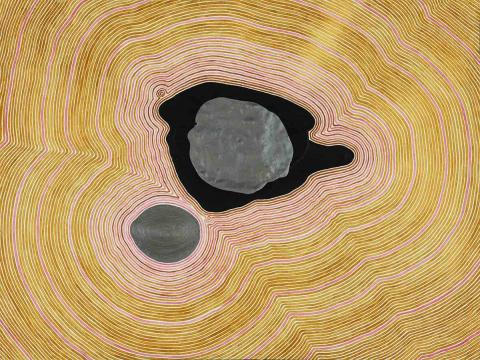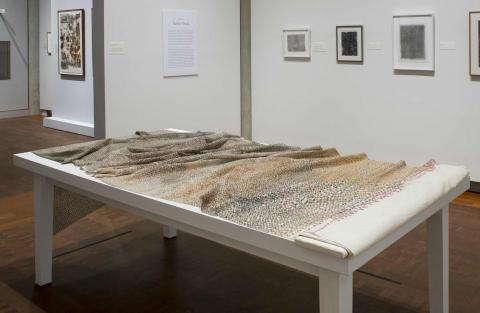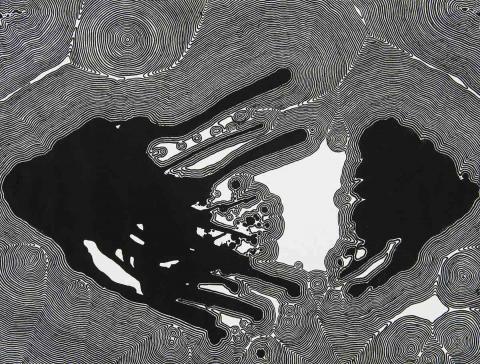Tilled Fields: Drawings by Harry Roseman now on view at the Frances Lehman Loeb Art Center at Vassar College
Tilled Fields, a solo show by New York sculptor and Vassar College Emeritus Professor of Art Harry Roseman, is featured in the Project and Focus galleries at the College’s Frances Lehman Loeb Art Center from July 3–September 12, 2021. A lecture given by renowned poet and art writer John Yau will be held on September 2. The exhibition closing reception is at 5:30 p.m. and the lecture begins at 6:30 p.m. in Taylor Hall 102.
Tilled Fields engages viewers with 18 striking drawings on paper and cloth. Completely independent from being made in preparation for other works of art, the drawings provide surfaces onto which Roseman cultivates his fantastic, patterned arenas of line. Drawings by Roseman exist as inventions simulating new structures and questioning the boundaries of imagery and the real. Whether tilled, woven, thatched, or patterned, lines abound within his drawn and painted fields with rigorous attention and generous and often playful, even obsessive, abandon.
The exhibition presents recent works as well as earlier drawings and “sculpture-drawings” made since the 1980s, when he began teaching studio art at Vassar. With this exhibition, the Loeb Art Center honors Roseman and his 40 years of service as professor of sculpture in Vassar College’s Art Department.
Born in Brooklyn in 1945, Harry Roseman earned a BFA at Pratt Institute in 1968. From 1969 to 1972, he was the studio assistant for surrealist-inspired American artist Joseph Cornell (1903–1972). In 1973, after Cornell’s death, Roseman assisted sculptor Tony Smith (1912–1980) in New Jersey and taught at various colleges before arriving at Vassar College in 1981. He retired from teaching at Vassar in 2020 and is currently Isabelle Hyman Emeritus Professor of Art.
Tilled Fields is sponsored by the Evelyn B. Metzger Exhibition Fund.
About the Frances Lehman Loeb Art Center
The Frances Lehman Loeb Art Center was originally established in 1864 as the Vassar College Art Gallery. The current 36,400-square-foot facility, designed by Cesar Pelli and named in honor of the new building’s primary donor, opened in 1993. Vassar was the first U.S. college founded with an art museum as a part of its original plans, and at any given time the galleries of the Loeb feature works from its extensive collections. The Loeb’s collections chart the history of art from antiquity to the present and comprise over 22,000 works, including paintings, sculptures, drawings, prints, photographs, and ceramic wares. Notable holdings include the Warburg Collection of Old Master prints, an important group of Hudson River School paintings given by Matthew Vassar at the college’s inception, and a wide range of works by major European and American 20th-century artists.
Admission to the Frances Lehman Loeb Art Center is free and all galleries are wheelchair accessible. The Loeb is now open to the public every day (except Monday) from 11 a.m. to 5 p.m. The Loeb is located at 124 Raymond Avenue near the entrance to the Vassar College campus. parking is available on Raymond Avenue. Get directions to the Vassar campus in Poughkeepsie, NY.
The Art Center is also accessible via the Dutchess County Public Transit, Bus Route L. For additional information, the public may call (845) 437-5632 or visit the Art Center website.
Land Acknowledgement
We acknowledge that Vassar stands upon the homelands of the Munsee Lenape, Indigenous peoples who have an enduring connection to this place despite being forcibly displaced by European colonization. Munsee Lenape peoples continue today as the Stockbridge-Munsee Community in Wisconsin, the Delaware Tribe and the Delaware Nation in Oklahoma, and the Munsee-Delaware Nation in Ontario. This acknowledgment, however, is insufficient without our reckoning with the reality that every member of the Vassar community since 1861 has benefited from these Native peoples’ displacement, and it is hollow without our efforts to counter the effects of structures that have long enabled—and that still perpetuate—injustice against Indigenous Americans. To that end, we commit to build and sustain relationships with Native communities; to expand opportunities at Vassar for Native students, as well as Native faculty and other employees; and to collaborate with Native nations to know better the Indigenous peoples, past and present, who care for this land.
Vassar College is a coeducational, independent, residential liberal arts college founded in 1861.
Contact: Alison Hendrie, (914) 450-3340
PHOTO: Download high-resolution images from the Vassar College Media Relations Flickr site


